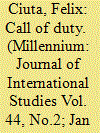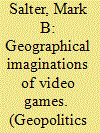|
|
|
Sort Order |
|
|
|
Items / Page
|
|
|
|
|
|
|
| Srl | Item |
| 1 |
ID:
144064


|
|
|
|
|
| Summary/Abstract |
This article attempts to further develop the IR research agenda on video games. The argument starts with a critique of the narrow focus on war-themed blockbuster games of current IR work on video games. I argue that this narrow view of IR and of video games is unsustainable and counterproductive, and has led to the positioning of IR as a regime of value with an unwarranted focus on the ideological effects of video games, and also to a paradoxical closing off of its research agenda. In the second half of the article I attempt to sketch two directions of research that could help overcome these initial limitations. The first outlines the potential for the IR study of the global aesthetic economy of video games, and the differentiated distribution of its regimes of value. The second encourages the study of game-worlds as practical-theoretical spaces where a particular relationship between academic subjectivity and its objects is constituted. The significance of this argument transcends IR video games research: it has relevance for cross-disciplinary issues regarding the status of academic moral-aesthetic judgements about cultural artfacts and practices; the relationship between academic and ‘popular’ knowledge; and the potential for political mobilisation at the interface of entertainment and social critique.
|
|
|
|
|
|
|
|
|
|
|
|
|
|
|
|
| 2 |
ID:
105350


|
|
|
|
|
| Publication |
2011.
|
| Summary/Abstract |
Video games are important sites for critical geopolitics, and this article engages in the analysis of Diplomacy, Civilization, America's Army, and Grand Theft Auto IV in order to understand how the geopolitical imaginary works in popular culture. It makes the argument that the claim to geopolitical and tactical verisimilitude is at odds with the representations of violence and the body in war. It concludes by mapping new directions for the study of video games.
|
|
|
|
|
|
|
|
|
|
|
|
|
|
|
|
| 3 |
ID:
191445


|
|
|
|
|
| Summary/Abstract |
Bringing together literatures on play, (video) games, and alter(native) geopolitics this paper explores how digital games offer playful encounters that challenge popular understandings of geopolitics. While geographical scholarship has exposed the ways video games promote geopolitical and militaristic cultures, this paper concentrates on the disruptive qualities of play. More specifically, the paper focuses on This War of Mine (2014), a game which fosters playful encounters that encourage the player to reflect on the everyday consequences of conflict in urban spaces and their civilian populations. Drawing on an analysis of player reviews of the game, this paper demonstrates how play shapes imaginaries of the geopolitical context(s) of urban conflict and stimulates players to reflect on their attitudes towards violence. In doing so, the paper critically demonstrates how digital games offer important cultural outlets in encountering alternative understandings of geopolitics.
|
|
|
|
|
|
|
|
|
|
|
|
|
|
|
|
| 4 |
ID:
108947


|
|
|
|
|
| Publication |
2011.
|
| Summary/Abstract |
Problems facing the United States and the world today are complex, and the solutions require an innovative workforce, a population with critical thinking and problem solving skills. As the need for people in science, technology, engineering, and math careers continues to grow, the number of students graduating American universities with degrees in these disciplines is decreasing. Reversing this trend requires action at the national (macro-level), and at the classroom (micro-level). For the past three years, Tech Matters has been working with a local university and the kindergarten through 12th-grade school district to address barriers to the integration of science, technology, engineering, and math in the classroom through development and use of computer gaming and simulations. The successful proof of concept of Games for Learning Collaboratory has paved the way for further development.
|
|
|
|
|
|
|
|
|
|
|
|
|
|
|
|
| 5 |
ID:
155292


|
|
|
|
|
| Summary/Abstract |
Popular culture is a significant interest for scholars of International Relations and world politics. This article explores the capacity of video games to articulate, represent, and simulate the practice of international politics in both narrative and procedural capacities through a study of the highly popular Mass Effect science fiction series of video games. The introduction of procedural rhetoric as a means of textual criticism is argued to address existing concerns within the study of International Relations to articulate the significance of representation with cultural texts and to extend the implications of claims about science fiction as a compelling set of contingent arguments about the broader sphere of social life that constitutes International Relations.
|
|
|
|
|
|
|
|
|
|
|
|
|
|
|
|
| 6 |
ID:
148676


|
|
|
|
|
| Summary/Abstract |
Digital games are among the most popular forms of entertainment media. Despite their ubiquity, the fields of political science, International Relations, and political communication have generally overlooked the study of digital games. We take up this void by examining the international enemies depicted in combat games – specifically, first-person shooter (FPS) games – which can speak to the process in the construction of international threats in society. Our review of framing the enemy gleans perspectives from multiple disciplines including International Relations, political communication, and digital gaming. Our empirical analysis traces the evolution of images in digital games from 2001 to 2013 to reveal the identity of the enemies and protagonists and to examine the context of the game – including the setting where each game takes place. We find that Russians are a popular form of enemy in FPS games even after considering terrorists as a broad category. Our review of the literature and our empirical analysis together present a foundation for the future study of digital games as a process of framing of enemies and transmission of threats.
|
|
|
|
|
|
|
|
|
|
|
|
|
|
|
|
|
|
|
|
|